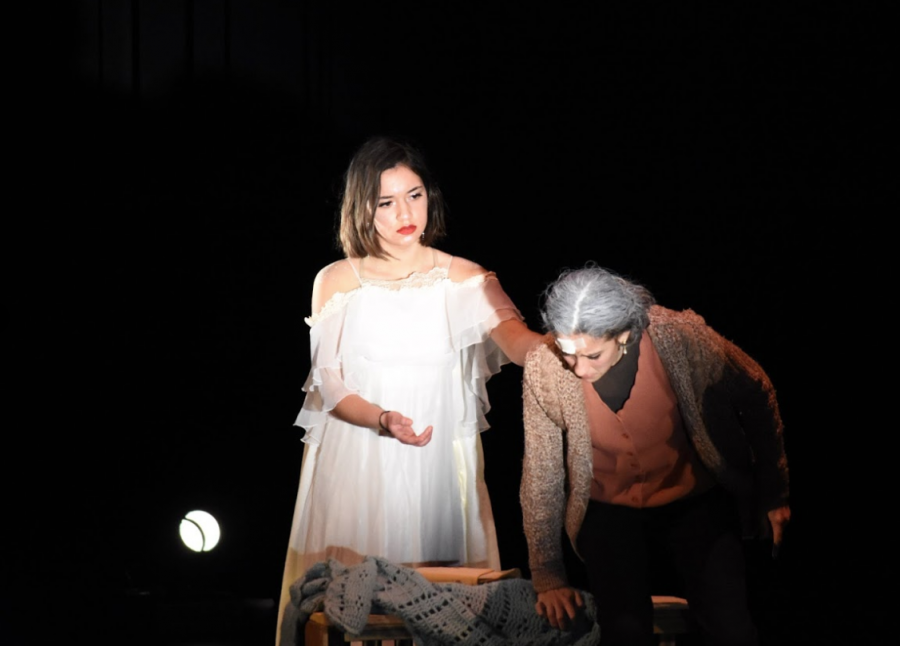Student-Created Festival Show “The Light She Gave” Makes State Finals
April 25, 2018
On Tuesday, March 20th, the CRLS drama department performed The Light She Gave in the Fitzgerald Theatre. This play is an original production developed over the past seven months by drama teacher Mr. Cramp’s Play Creation class. The class entered it into the Massachusetts Educational Theater Guild One-Act Play Competition and advanced all the way to state finals.
The Light She Gave begins with a fantastical scene: a young girl infused with light, living in the clouds. She descends to Earth to play with the other children, and for a while, she is happy bestowing her light on others. However, she soon feels pressured to give too much of her light and has none to keep for herself.
The play then moves to the interlocking stories of three female characters undergoing various struggles. Penny, another girl (senior Jesse Pellman), is tormented by the Grack (senior Kyla Friedan), an embodiment of her anxiety who prevents her from playing outside in the snow with the other children.
Lennette (senior Lily Grob), an old woman, is struggling with the anguish of moving into a nursing home. These stories are linked by Beth (junior Rachel Alexander), a young psychologist who treats Penny’s depression and fears and is a counselor at the nursing home. She gives to others so much that it compromises her relationship with her longtime boyfriend Kyle (senior Ajani Acloque).
Throughout these stories, Light, the girl from the clouds (junior Micaela “Mica” León Perdomo), has a silent but powerful presence in each scene of the play. In the end, Light realizes that giving to others actually strengthens her and is the source of her power.
After the performance at CRLS, the cast and production team assembled on the stage for a question and answer session about the play and its creation process. León Perdomo answered the first question—about the purpose of her character—replying that Light represents the “force in Beth, Penny, and Lennette that pushes them to see their truth.” The character “gives her light to them,” giving them strength to face their struggles.
Another question concerned the core ideas the Play Creation class wished to express. “We originally started talking a lot about truth, and [we explored] facing your own truth,” responded Grob. “I think that evolved into the truth of giving and being a caretaker for other people … and being a caretaker for yourself, too.”
“I love the process of it,” Mr. Cramp remarked in a later interview. “It’s really interesting to start with nothing and then just slowly work away until you create something.” The class developed the play through keeping running lists of potential ideas on large sheets of paper plastered on the walls of the drama classroom.
“We pumped so many ideas out there,” said senior Atticus Olivet, who played Jack, the son of Lennette. “There were so many directions we could have gone.” Over the seven-month creation process, there were many tweaks made to the story, which “only came together a couple weeks ago,” according to Olivet—a response that garnered laughs from the audience.
One Play Creation student, senior Maija Harvey, became the script advisor, instrumental in compiling the many ideas into a cohesive story. Still, the cast continued to tweak the script. “We finished the script yesterday,” remarked Grob to more laughs.
The ever-changing script forced the production team to continuously change what they were doing. “Mica [Light], in the very beginning, was going to be a coal miner,” remembered senior Pia Costello, who worked in costume design and execution.
Nevertheless, the production team did well in the competition, winning two awards for projection, one for costumes, and one for overall design.
The Light She Gave was performed at the state finals in Boston’s John Hancock Hall from Thursday, March 22nd to Saturday, March 24th.
Although they didn’t win, “[the cast is] all at peace with that,” said Grob. “In the end, it was our best run, it moved our family and friends—really impacted the audience—and it’s the whole experience that will stick with us.”
This piece also appears in our March/April print edition.











